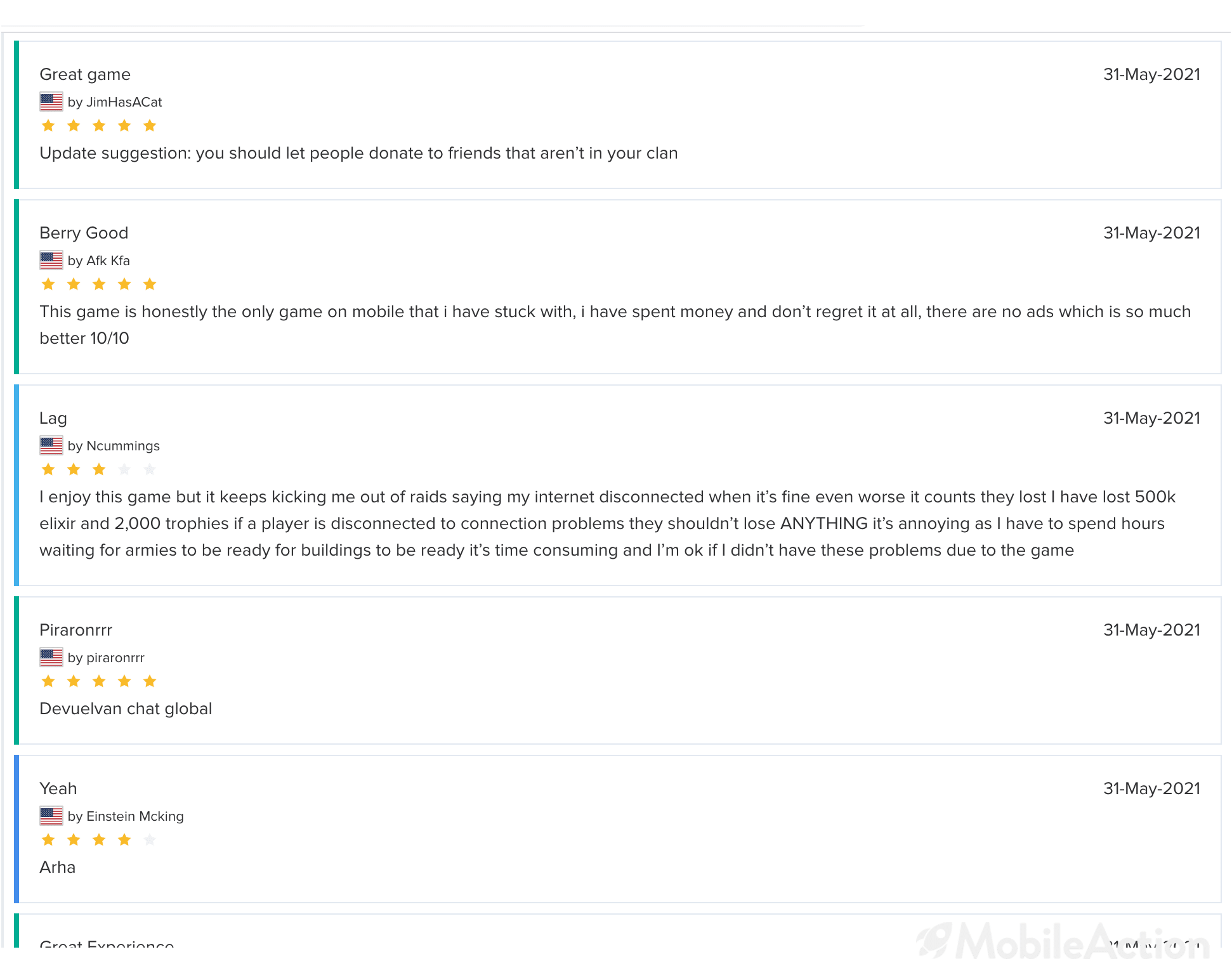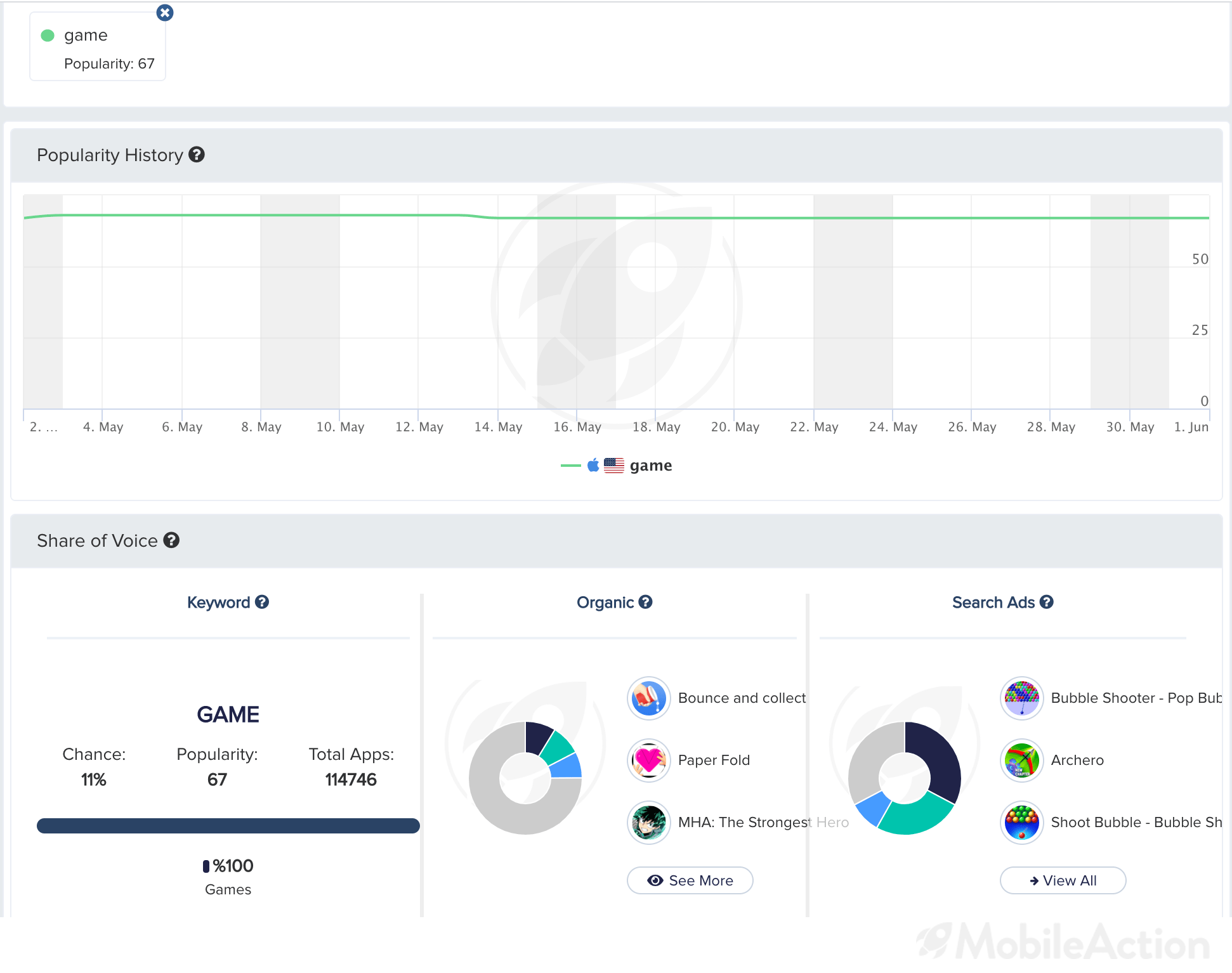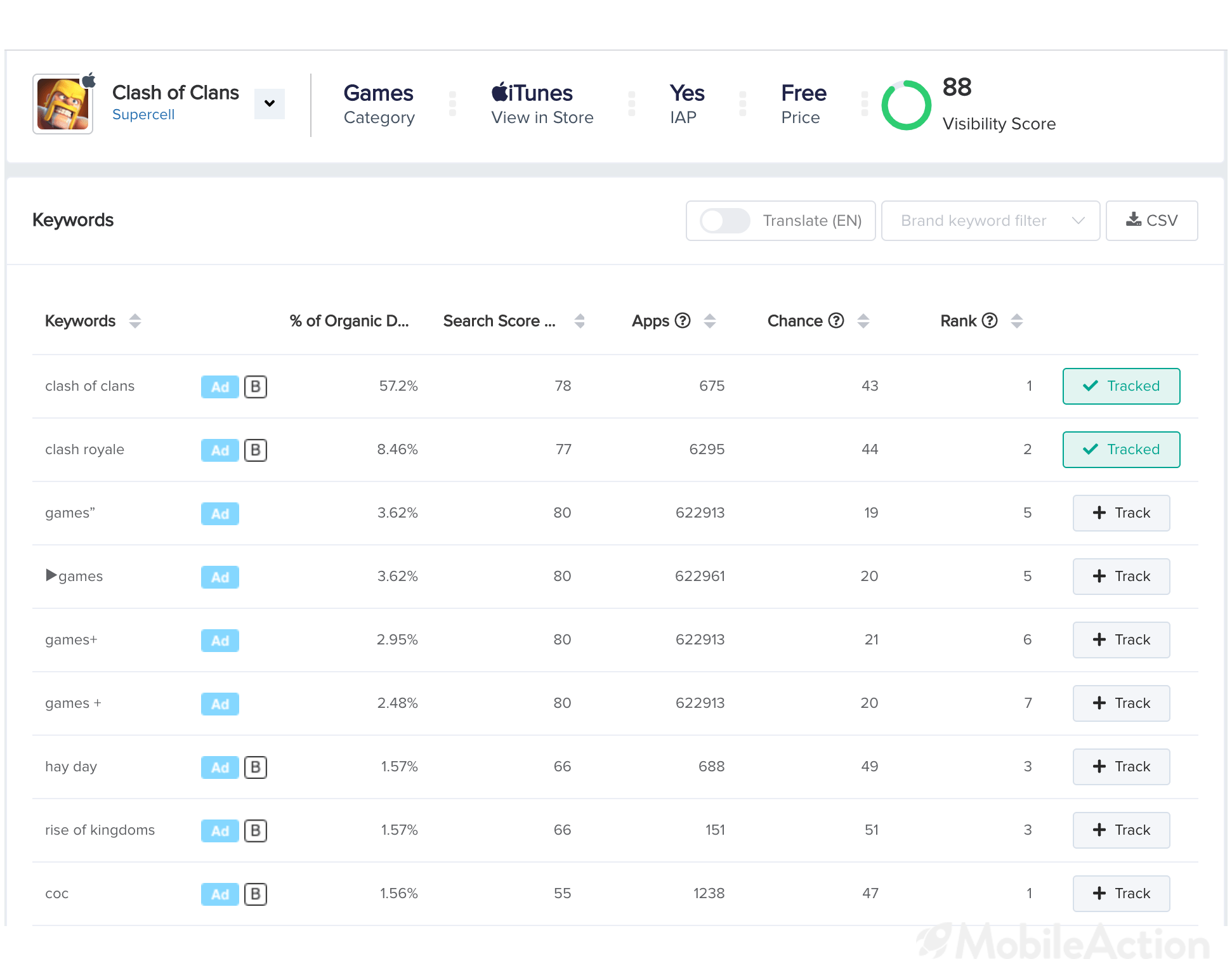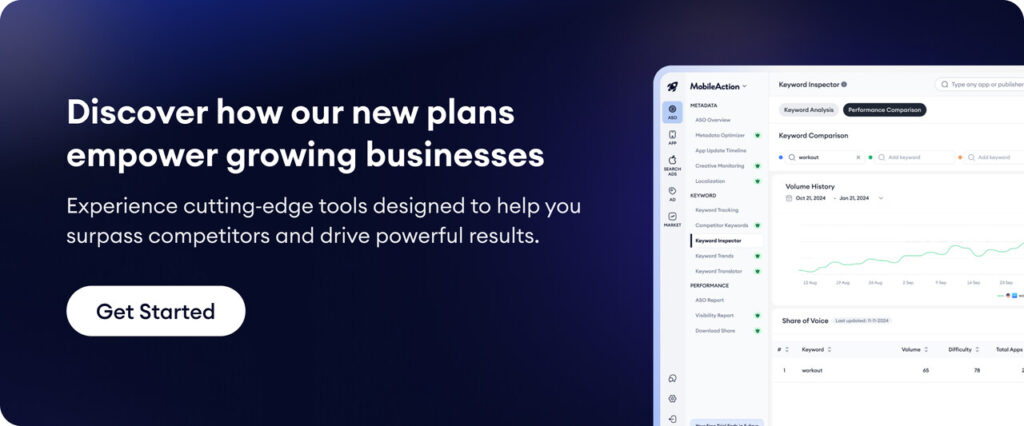We have previously discussed how ASO is a two-step process. In this post, we will have an overall look at the set of practices called App Store Keyword Optimization which primarily try to increase the visibility of your app in the app stores.
Increasing your visibility in the app stores is all about keywords. That’s why the set of processes to increase the visibility of your app is called Keyword Optimization.
Having the best possible keywords to represent your app in the app stores is, perhaps, the most important aspect of your ASO strategy.
In this post, we will explore the most effective ways of finding the best keywords for your app that will allow you to; reach your target audience, rank as high as possible, and get downloads from the highest quality users.
The widely accepted practice of Keyword Optimization has 3 steps that should be repeated each time you do a series of ASO changes.
First, you have to find some keyword ideas. After that, you should choose the most promising ones and work over them to create new combinations and long-tail keywords.
The final step is to wait and measure the performance of these keywords. Based on their performance you will repeat the process based on your findings. After each wave of App Store Keyword Optimization, your keywords will get closer to perfection.
Finding keywords
The first and foremost step you are going to take while doing Keyword Optimization is to find some potential keyword ideas. After all, how can you do app store optimization keyword research if you don’t have a starting point?
These can be called as Seed Keywords & Root Keywords.
The goal is to come up with a wide list full of root keywords that can later be turned into long tail keywords or combinations.
There are several tried and tested methods that are used by most of our users, and of course by us when we were a small ASO agency.
Brainstorming
This is, perhaps, the most obvious one.
However, it’s one of the best ways to find good keyword ideas.
You should gather around some people from your company, friends, family and think about potential keywords that can be used to represent your app in the app store.
It’s imperative to think like your potential users. Try to think about how would you search for an app like yours in the app store. Those keywords are usually well-performing keywords as all the metrics that signify keyword performance are the result of human action.
Also while thinking about potential keywords, have a look at what other words, phrases might be used in their place as well.
Consulting a thesaurus might prove invaluable in finding alternative keyword ideas.
Web research
As with all other subjects, the web is one of the best sources of information to get good keyword ideas. There are numerous ways you can leverage the knowledge out there to get decent keyword ideas. These tips might help you with your app store optimization keyword search:

Forums can be a great source of keyword ideas. Going to forums that are about your app will give you so many ideas as you will be seeing the language the community around your subject is using.
Secondly, have a look at the websites of your competitors. You can see which traits of their product they are trying to market. Moving on from there, you can get good keyword ideas revolving around those traits they are promoting on their website.
Keep in mind, ASO and SEO for the same app will not necessarily use the same keywords. You can use this to see what your potential users’ needs are, and do keywords research using MobileAction’s tools after that to see which ones are getting results.
Review mining
We have a complete post dedicated to App Reviews & Ratings. You will find a more detailed approach to Review Mining there but let’s still briefly talk about it.
Review Mining is a practice you should constantly do as it gives you so much feedback about your apps’ performance.

Reviews can also be a great source of keyword ideas. You can see how people view your features and what kind of wording they use for those keywords.
You can also have a look at your competitors’ app reviews to get keyword ideas from their users as well.
Overall, reviews are often overlooked by many as a source of keyword ideas but, they are a wonderful way to come up with keywords .
Reviews often indicate peoples’ problems with your competitors apps as well. Finding these pain points for your competitors can indicate to you what search terms disgruntled users may be using.
For example, if people are dissatisfied with their regular messaging app, they may be searching for “messaging app” or “
Competitor analysis
Among all of the ways of finding good keyword ideas, Mobile App Competitor Analysis is probably the best and most reliable way of finding good keywords. However, it also requires you to have a tool at your disposal to find those keywords. MobileAction has great tools for finding competitors using keywords and finding keywords using competitors. We have a full post about all the ways to find competitors using ASO and a few posts about finding keywords using competitors.
For example, you can see all of the keywords your competitors are using with MobileAction. Not only can you see the keywords they are using, you can see their ‘best’ performing keywords.
By best performing, it can refer to both the keywords they are ranking the highest or the keywords they get most of their downloads. Being able to know them both, however, is the best possible scenario.
That way you can aggressively target the keywords that are bringing them the most value and start competing with them to get a slice of the cake. Knowing the actually well-performing keywords saves you an immense amount of time.
Still, don’t overlook the value of the other methods you can bring to your ASO efforts.
Choosing the right keywords
Now, let’s assume that you have come up with a big list of keywords. How are you going to choose the ones you want to use for your app? As the keywords you can use are limited, you have to make a choice!
Check out this video on how we can choose our keywords using Clash of Clans as an example.
So, what are the points you should pay attention to when choosing the best keywords for your app? Let’s have a look, shall we?
Volume
The volume is a score we use at MobileAction to measure the popularity of a keyword. So, this score is a number scaling from 1 to 100 and the higher it is the more searches are done for that keyword.
Why is this relevant?
As keywords are there to represent your app in the app store, selecting keywords that can reach a lot of people would allow your app to be more visible.
Therefore, after you have compiled a list of potential keywords, add them to our dashboard and measure their volume.
The higher the volume the better for your app and the ideal number changes from market to market but an average for a decent volume would be 40+ volume.
Chance
Finding highly popular keywords, sadly, isn’t enough when deciding which keywords to pick up.
You also want to rank well for those popular keywords. To measure that, MobileAction has come up with a metric called chance.
Basically, chance measures the competitiveness of a keyword by looking at the Top 10 apps ranking for that keyword.
It’s only natural to say that while deciding which keyword to go forward with, also have a look at their chance.
If it’s a decent one then that can be a good fit for you. The main point here is to keep both Volume & Chance as high as possible. Because the best case scenario is to rank for a popular keyword that is not too competitive.
Relevance
Now there’s one more factor that you should keep in mind when picking up the best keywords, Relevance.
This one can’t be transformed into numbers and deciding if it works is entirely up to you.
Having keywords with good volume and chance is definitely good. However, if those keywords aren’t relevant to your app or if they don’t reach the right audience there’s no point in using those keywords as they won’t translate into high-quality organic downloads.
Measuring your keywords
App Store Optimization is no simple task. It takes a good bit of time and effort.
Keyword Optimization is one of the main practices done under ASO. However, App Store Keyword Optimization is not a one-time practice. Quite the contrary, it’s something you should be constantly doing in waves. So, how to optimize app store keywords?
The final step of a wave of Keyword Optimization is to measure the performance of the keywords you have chosen.
Measuring the performance of keywords can be a tricky process. It can be even trickier without a proper tool. That’s another reason why MobileAction is a good tool to have at your disposal.
How to Measure?
There are several ways to measure your keyword performance. Each of them can be accessed through the MobileAction dashboard.
App store keyword ranking history
After you have started to rank for a keyword, you can track how your keyword ranking has changed over time. So, you can see how your performance is changing for a keyword.

After you have started to rank for a keyword, you can track how your keyword ranking has changed over time. So, you can see how is your performance changing for a keyword.
App store category ranking history
Your keyword rankings also affect your category rankings, so after you have done a wave of App Store Keyword Optimization, you can monitor your category ranking to see if the new keywords are bringing results to your app.
Organic downloads from a keyword
Other than tracking your rankings, you can also measure your keyword performance based on organic downloads.
With the Keyword Intelligence tool of MobileAction, you can see the percentage of downloads a keyword brings to your app.You can, obviously, see this for your app competitors as well but our subject now is to measure ‘your’ performance.

Based on the performance of the keywords you can choose to monitor some of them further.
You should remove the underperforming ones and try new ones.
With each passing wave of Keyword Optimization, you will have a more refined list of keywords for your app. Eventually, you will start ranking very high for all of the keywords you are using and that will translate to more downloads and more revenue.
Combining ASO with Apple Search Ads
We have also written in this post about how ASO and Apple Search Ads can work together. Seeing as Apple Search Ads and ASO are both processes that involve highly searchable keywords, you can use Apple Search Ads to help you with your ASO in the Apple App Store.
You can include some high-performing keywords in your title and metadata. Not only will this ensure that these keywords are going to be getting a lot of search results, including them will increase their relevance according to Apple’s algorithm and will better their results with Apple Search Ads as well.
Of course, this tip does not directly apply to Play Store Optimization, and to make it part of your ASO tools for Android, you would need to take the discovered keywords and test them as you should with any other keywords from your brainstorming.
Let’s wrap things up App Store keyword optimization
ASO is your best friend for getting more downloads and finding new users.
When asking yourself how to optimize app store keywords, you should:
- Brainstorm
- Do web research
- Look at reviews
- Analyze your competitors
In order to chose the best of those for your app store keyword optimization you should check:
- Volume
- Chance
- Relevance
And to measure those results you can look at
- App Store Keyword Ranking
- App Store Category Ranking History
- Organic Downloads from that specific keyword
App Store Keyword Optimization is a long and repetitive process but the results are incredible. Once you have that carefully refined keyword list and start ranking for those keywords you will be getting a great number of organic downloads.
Remember that organic downloads are the best kind of downloads as organic users usually have higher retention rates and are more likely to spend money on your app. If you liked this app store optimization guide and are interested in using any of our app store optimization tools to help you with your app store keyword optimization, sign up for a demo!






